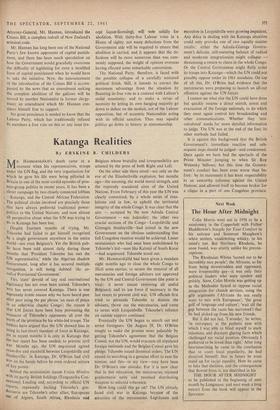Katanga Realities
By ERSKINE B. CHILDERS MR. HAMMARSKJOLD'S death came at a moment when his representatives, troops under the UN flag, and the very organisation for which he gave his life were being pilloried in Britain in one of the most sordid episodes of pres- sure-group politics in recent years. It has been a clever campaign by two closely connected lobbies —Katanga, and the Central African Federation. The political circles involved-are precisely those that have always preferred traditional power- Politics to 'the United Nations; and now almost all perspective about what the UN was trying to do in Katanga has been lost.
Despite fourteen months of trying, Mr. Tshombe had failed to get himself recognised by a single government anywhere in the entire world—not even Belgium's. Yet the British pub- lic have been told almost daily during those months that 'President Tshombe has met the UN representative,' while the Algerian shadow Government, long after it has secured multiple recognition, is still being dubbed 'the so- coiled Provisional Government.'
This 'state' devoid of any real international legitimacy has not even been united. Tshombe's Writ has never covered Katanga. There is one supremely ironic reason why we have heard peer after peer using the pat phrase 'an oasis of peace in an otherwise chaotic Congo'; the reason is that UN forces have been busy preventing the Massacre of Tshombe's opponents all over the north of the province by his white-led troops. The lobbies have argued that the UN showed bias in Using its last-resort mandate of force in Katanga; Yet in recent months it is only in Katanga that the last resort has been needed, to prevent civil War. Months ago, the UN negotiated agreed cease-fire and standstill between Leopoldville and Stanleyville: in Katanga, Dr. O'Brien had civil War on his hands before he even ordered seizure of key points.
Behind the secessionists stands Union Miniere with its partly British holdings (Tanganyika Con- cessions). Leading and, according to official UN reports, repeatedly inciting Tshombe's gen- darmerie are Tshombe's other allies; Europeans out of Algiers, South Africa, Rhodesia and Belgium whose brutality and irresponsibility are attested by the press of both Right and Left.
On the other side there stood—not only on the eve of • the Elisabethville explosion, but months ago—the meaning, the world moral strength, and the expressly mandated aims of the United Nations. From February of this year the UN was clearly committed, by a whole series of reso- lutions and in law, to uphold the territorial integrity of the whole Congo. It was clear that the aim — accepted by the new Adoula Central Government — was federalist; the other two crucial sections of the Congo—Leopoldville and Gizengist Stanleyville—had joined in the new Government on the obvious understanding that full Congolese reunion would be achieved. Lesser secessionists who had once been emboldened by Tshombe's bid—men like Kalonji of South Kasai —had acquiesced. Tshombe stood out.
Mr. Hammarskjold had been given a mandate eight months ago to close the whole Congo to illicit arms entries; to secure the removal of all mercenaries and foreign advisors not approved by the UN and Central Government (the point is vital : it never meant removing all useful Belgians); and to use force if necessary in the last resort to prevent civil war. UN officials first tried to persuade Tshombe to dismiss the advisers, throw out the mercenaries, and come to terms with Leopoldville. Tshombe's reliance on outside support continued.
Eventually the UN began to search out and arrest foreigners. On August 28, Dr. O'Brien sought to make the process more palatable by getting Tshombe's agreement that the Belgian Consul, not the UN, would evacuate all stipulated foreign nationals and the Belgian Consul gave his pledge. Tshombe issued dismissal orders. The UN ceased its searching in a genuine effort to ease the tension, and this—in my view—may have been Dr. O'Brien's one mistake. For it is now clear that in this relaxation, the mercenaries rejoined gendarmerie units and resumed distributing weapons to selected tribesmen.
How long could this go on? The UN already faced civil war in Katanga because of the atrocities of the mercenaries. Legislature and executive in Leopoldville were growing impatient. Any delay in dealing with the Katanga situation could only provoke one of two equally sinister results: either the Adoula-Gizenga Govern- ment's delicate, still-maturing balance of radical and moderate integrationists might collapse threatening a return to chaos in the whole Congo. Or the Central Government might flatly order its troops into Katanga—which the UN could not possibly oppose under its 1961 mandates. On top of all this, Dr. O'Brien had evidence that the mercenaries were preparing to launch an all-out offensive against the UN forces.
I cannot see what else the UN could have done but quickly resume a direct search, arrest and evacuation of the foreign nationals, to do which they must again control key broadcasting and other communications. Whether they 'mis- calculated' needs far more detailed ,information to judge. The UN was at the end of the line; its other methods had failed.
It is against this background that the British Government's immediate reaction and sub- sequent steps should be judged—and condemned. Once again we have had the spectacle of the Prime Minister jumping to when Sir Roy Welensky bellows; but this time the Govern- ment's conduct has been even worse than be- fore:' by its statements it has leant respectability to an unworthy calumny against the United Nations, and allowed itself to become broker for a clique in a part of one Congolese province.










































 Previous page
Previous page